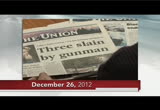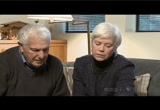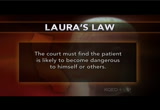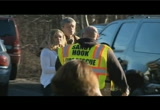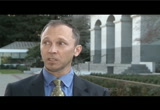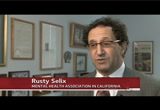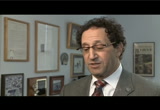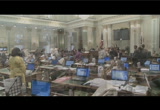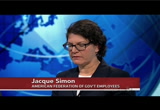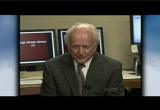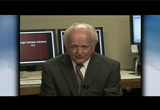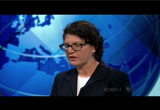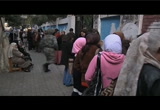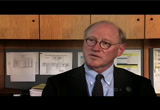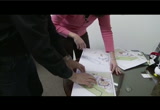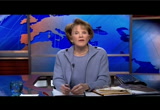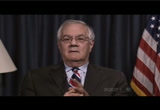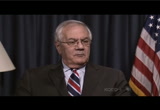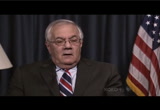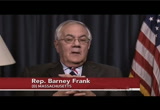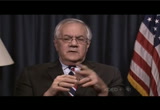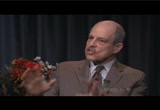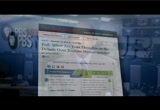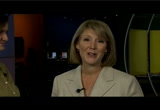tv PBS News Hour PBS December 27, 2012 12:00am-1:00am PST
12:00 am
captioning sponsored by macneil/lehrer productions >> ifill: a massive winter storm disrupted travel today for tens of thousands of americans across the country. good evening, i'm gwen ifill. >> warner: and i'm margaret warner. on the "newshour" tonight, we get the latest on the snow, sleet and rain that have snarled roads, knocked out power and delayed flights. >> ifill: then, with images from the connecticut massacre still raw, spencer michels looks at a california law that aims to head off such violence. >> reporter: though no one knows the diagnosis of the perpetrator of the shootings in newtown, the killings have raised once again the issue of forcing the mentally ill into
12:01 am
treatment. >> warner: as congress comes back to washington to resume fiscal cliff negotiations, we ask, what happens if they don't reach a deal? >> ifill: we talk with a representative of egypt's muslim brotherhood about the new brotherhood-backed constitution signed into law today. >> warner: and we have another of our conversations with retiring members of congress. paul solman sat down with the always outspoken massachusetts democrat barney frank. >> the notion that people would not go along with an important public policy because i hurt their feelings, i don't think that's true. >> ifill: that's all ahead on tonight's "newshour." >> major funding for the pbs newshour has been provided by: >> and with the ongoing support
12:02 am
of these institutions and foundations. and... >> this program was made possible by the corporation for public broadcasting. and by contributions to your pbs station from viewers like you. thank you. >> ifill: a major winter storm surged into the midwest and northeast, fouling flight schedules and ruining road conditions on this day after christmas. the huge weather system left a trail of destruction in the gulf coast region and at least six people dead. >> oh, wow, oh jesus, look at that tornado. >> ifill: the calm of christmas night was shattered by tornadoes dropping from the sky across much of the deep south. this one hit near downtown mobile, alabama, ripping apart a church, a high school and a number of homes. at least 34 twisters struck in texas, louisiana, mississippi
12:03 am
and alabama, tearing walls from homes and tossing cars onto one another. by this morning, heaps of debris dotted the gulf region. >> this use to be a really big, as you can tell by the size of the slab, use to be a huge feed store, metal. it wasn't a weak building at all. you can see what it did to it. amazing. >> ifill: the same system that spawned the tornadoes dropped record snow on arkansas and texas, turning christmas lights into icicles and forcing would-be travelers to think twice. >> my mom and dad live in el paso and i was planning on going to el paso, but i think i'll be staying home now. >> ifill: in oklahoma, the icy conditions led to this 21-car pile-up last night. from there, the huge storm front lumbered on, bringing blizzard warnings in indiana and ohio. to the northeast, more than a foot of snow was expected from new york state to maine. by last night, it was already on
12:04 am
the way. >> the winds were fierce it was blowing the cars around and you could see the semi's were swerving. >> ifill: the storm also forced cancellation of hundreds of flights and the ripple effects reached as far west as san francisco. >> after i found out my flight had been canceled after four hours of waiting in the airport, i had to wait another three hour customer service line, which i didn't even get to the end of before the booth closed. >> ifill: about a 1,000 people spent christmas night on cots at dallas/fort worth international airport. by dawn, patience was wearing thin. one fed-up pilot apologized to his passengers over the loudspeaker, after they were forced to wait on the tarmac for almost five hours. >> ifill: by this evening, the
12:05 am
worst of the weather was moving into new england. but in its wake, nearly 200,000 customers had lost power across the southeast and midwest, making home for the holidays unexpectedly cold and dark. >> warner: still to come on the "newshour": court-ordered treatment for the mentally ill; deal or no deal; what's next, the view from the muslim brotherhood and massachusetts congressman barney frank. but first, the other news of the day. here's kwame holman. >> holman: toyota motor company agreed today to pay more than $1 billion and settle claims of sudden acceleration. court filings in california said the auto maker will install a brake override system in more than three million vehicles. it also will make direct payments to affected customers. the agreement is subject to approval by a federal judge. >> reporter: thousands of sunni demonstrators in western iraq staged a mass protest today against the shi-ite-dominated government, the third in less than a week.
12:06 am
protesters filled the streets in ramadi in anbar province chanting "topple the regime." the demonstrations began after police arrested ten bodyguards assigned to the sunni finance minister. >> reporter: the parliament of japan has elected shinzo abe as the country's seventh prime minister in six years. abe was sworn in today after being chosen by his conservative-leaning liberal democratic party. the party won power in this month's elections, for the first time since 2009. abe has called for bold measures to bolster japan's ailing economy. he previously served as prime minister from 2006 to 2007. russian lawmakers gave final approval today to a ban on americans adopting russian children. it's part of a series of reactions to a u.s. sanctions law targeting russian human rights abusers. in washington today, a state department spokesman called the ban misguided. and adoption groups in moscow said it would harm children most.
12:07 am
>> ( translated ): today we don't have that number of russian families who are willing to adopt, and the children who go to adopted families abroad are the children that russian families wouldn't take. there must be at least five refusals by russian families for the child to go to foreign parents. for that reason i don't see within this law an improved situation for these children. >> holman: russian president vladimir putin defended the legislation last week, without saying directly that he would sign it. in economic news, a mastercard report said u.s. holiday sales so far have been the weakest since 2008. and wall street failed to get any momentum today. the dow jones industrial average lost 24 points to close at 13, 114. the nasdaq fell 22 points to close at 2,990. those are some of the day's major stories. now, back to margaret... >> warner: we turn to the difficulties of getting mental health care to those who need it. it's a subject getting more attention in the wake of the several recent shootings. it's not known if the gunman in
12:08 am
newtown, connecticut suffered from mental illness. but the man who shot four firefighters in webster new york this week-- killing two of them who were remembered at a procession yesterday-- left a disturbing note in which he pledged to burn down the neighborhood and quote "do what i like doing best, killing people." politicians and commentators have used these and prior attacks to call for improved mental health screening and treatment. but one such program in california has proven hard to implement, as newshour correspondent spencer michels reports. >> i wanted the world to know what a wonderful, incredible person she was. >> reporter: for more than a decade, nick and amanda wilcox have been advocating timely treatment and early intervention for the severely mentally ill in the hopes they won't become violent. twelve years ago, their 19-year old-daughter laura wilcox, a college sophomore, was murdered by while she was working over christmas break at a mental
12:09 am
health clinic in nevada county, california. >> at about 11:30 a client at the clinic came in and shot laura four times at point black range through the glass. >> what we know now after the fact is he had late onset paranoid schizophrenia. >> reporter: laura's murderer, scott thorp, killed two others, and then went home and took a nap. he was eventually sentenced to a locked mental hospital for life. >> we felt that laura's death was a result of a failed mental health system. we wanted to help prevent people from being so mentally ill that they would commit a violent act. >> reporter: helen thomson, a former psychiatric nurse, was a california legislator at the time, working on a law to get treatment and social services like housing for reluctant and sometimes dangerous mentally ill individuals. people who were not covered by existing laws. >> they were resistant. they didn't want to go to the clinic, or they didn't want to
12:10 am
take their medicine or they just simply weren't willing to participate. we were answering the frustrations of families who, were told they didn't need help; they called the police. the police would take them to the hospital or the jail. they'd be released back on the street and it became a rotating, circular activity. >> reporter: thompson named her law for laura wilcox. after much contentious debate it passed in 2002. a major aim is to provide aggressive treatment for those existing laws miss; people who may not have committed a crime, yet, but have a history of prior hospitalization and appear to be on a downward spiral. laura's law provides court ordered outpatient treatment for the seriously mentally ill for up to six months. the court must find the patient is likely to become dangerous to himself or others. the patient must have a history of not complying with treatment. the process can be requested by
12:11 am
parents, roommates, siblings, a spouse, as well as mental health workers and police. >> i think this is a perfectly good way to go. it beats doing nothing. >> reporter: for patients who don't comply, the court has the power to send them to the hospital for an assessment, which is a threat designed to convince them to comply. legislators never funded the law; they said that supervisors in each of california's 58 counties had to implement and pay for it. only one county-- nevada county- - where laura lived has opted in. with fewer than 100,000 residents, it sits in the foothills of the sierra nevada mountains, a center of mining during the gold rush. nationwide, 43 states other than california have laws permitting some form of involuntary outpatient commitment. though no one knows the diagnosis of the perpetrator of the shootings in newtown, the killings have raised once again the issue of forcing the mentally ill into treatment. it was raised when laura's law was passed and remains an point of contention.
12:12 am
>> coercive programs, fears of things like involuntary treatment, fears of having your dignity and your rights taken away, drive a lot of people away from things that would help. >> reporter: eduardo vega suffered from mental illness when in his 20s. he is the executive director of san francisco's mental health association and took part in a news conference with legislators to boost support for mental health programs in california and across the country following the newtown shootings. but vega is opposed to the involuntary treatment programs in laura's law. >> i've had some bad experiences in mental health services. there's so many people who, precisely because they're afraid of things like coercion, things like being locked up, being labeled, they don't receive any services, they don't talk to anybody, they become more isolated. >> reporter: vega says that in the wake of a tragedy, politicians often rush to pass unhelpful legislation. >> the laura's law project was
12:13 am
driven by this example of a tragedy and spoke to people's needs to want to try to do something different. and in this case it wasn't the right thing. but yet it can be that we rushed to create a solution before really thinking about what the implications are of it. >> reporter: the debate over involuntary treatment is familiar ground at the non profit turning point community programs in nevada city, which provides services for the county's mentally ill, including those who fall under laura's law, and many who don't. some of the patients, like 36- year-old jonathan maurer-- here for a long acting injection for his paranoid schizophrenia, and to meet with a psychiatrist-- resent being ordered to receive treatment. today maurer accepts voluntary treatment, for his paranoia; though he claims to have been mistreated previously. >> they gave me a catheter, and strapped me down naked on the hospital bed and then sedated me. they strip you of all your
12:14 am
rights. i just don't see how they expect to logically assume that treating people with violence is going to cure violence. >> reporter: but debra simmons-- mother of a very disturbed son who gets treatment here-- praises laura's law and involuntary treatment for essentially saving his life. she didn't want his name used. >> he gets angry and agitated, doesn't sleep, doesn't eat, just goes through a whole cycle of events that just kind of spiral downward until he's become a concern to the society if he's out in public. we had to call the police, and he struck my husband; physically we've had to lock ourselves in our room. he's torn our house apart. >> reporter: her son, she says, refused treatment until it was ordered under laura's law. >> he doesn't think he's ill. he doesn't recognize even when
12:15 am
he's at his worst. he doesn't recognize that he has an illness. he thinks everyone else in the room or the community has a problem, not him. >> reporter: for simmons, laura's law, has been a game changer. >> without that, i believe he would have injured someone else, or himself, and i don't believe we would have him today. >> reporter: still, many in the mental health community like rusty selix-- say the law builds up false expectations. selix, executive director of the mental health association of california, says it applies to very few people. >> the belief that every single person out there who has a mental illness and doesn't, you know, seek treatment for it is going to be helped by laura's law is just nonsense. they're not a danger to anybody. the irony of course is it wouldn't have applied to any of these mass shooters. none of them were in that situation, or if they were, they
12:16 am
were very good at hiding it from everyone around them. >> reporter: selix says nevada county, where the law is in effect but has been used in just 54 cases is too small to be a model for big cities with vast mental health populations. besides, he argues, much of what it does is covered by other laws; it's the funding that's missing. >> it's a very expensive and cumbersome process. maybe in a small rural county like nevada its not that expensive and cumbersome, but in all the larger counties to go through this enormous court process to get people into an outpatient program that we already have, and that we have hundreds of people on the street that are desiring of it, and we don't need a court order to get, what do we get out of it? and the feeling is that it doesn't really add that much. >> reporter: but at the nevada county courthouse, presiding judge thomas anderson says the law has been very effective with two thirds of the cases, avoiding time consuming court hearings.
12:17 am
>> it's saving tons of time, getting people into treatment when they need it, and the results have been very, very good. in the first couple of years, we saved a half a million dollars in our small county, which is a huge factor. this is a tool that's been missing forever from our mental health providing statues. >> reporter: anderson says the law tries to prevent psychotic patients from acting out and getting worse. >> the purposes of laura's law and the goal here is to catch them before that happens, engage them in treatment, hopefully voluntarily, and allow them to get some stability and then build on that stability to get back into a more normal lifestyle. >> reporter: the california legislature recently extended laura's law, but still hasn't funded it. outside nevada county, los angeles has started a very small pilot program to implement laura's law, and several other counties have debated it. but with budgets tight, implementation by cash-strapped
12:18 am
counties appears problematic. >> ifill: president obama heads back to washington tonight, as house republicans call on the senate to come up with a plan to avert the fiscal cliff. with prospects still murky for a deal before year's end, what can government workers, wall street investors and taxpayers expect if lawmakers miss the deadline? for that, we turn to stacy palmer, editor of the chronicle of philanthropy. jackie simon, public policy director of the american federation of government employees. and hugh johnson, who runs an investment and advisory firm in albany, new york. you all represent different constituencies. i want to start with you, jackie. -- sorry, i want to start with you, stacy, and talk about philanthropy. this is the end of the year when people are making their decisions about whether they're going to get tax breaks or who they're going to give to.
12:19 am
are people looking at the fiscal cliff and saying "i don't know"? >> absolutely. people are uncertain as to whether there's going to be a charitable deduction next year, things like the estate tax will change. so it's a rocky time. so some people are giving more and deciding "i'm going to get the tax break now and do it while it's a good thing for sure" and some people are putting off the decision deciding they isle give more later. so we're seeing a mixed bag but it's a tough time because this is the time of year when most people are doing a lot of charitable giving. >> ifill: let me get your name right this time, jackie, and ask you about federal employees. they are affected by this. there are furloughs, cutbacks, tell me what people are thinking. >> well, federal employees are in the uniquely bad position of facing peril regardless of whether there's a deal. or whether sequestration and the fiscal cliff occurs.
12:20 am
>> ifill: the across-the-board cuts. why does it work that way? >> in the event no deal is made and we do have the automatic cuts known as sequestration starting in january, federal employees face job loss and in some situations-- certainly in the department of defense-- but throughout the federal government people will be furloughed, forced to take unpaid days off, anywhere from 20 to 50 days. we really don't know. it depends in part on the agency and it depends in part on how much of the remainder of the fiscal year these cuts are squished into. so it's -- that's one bad situation. and then the so-called grand bargains and deals, many of those include provisions that would cut federal retirement benefits and extend the current pay freeze for an additional three years so that federal employees would go five full years without any paid a justments. >> ifill: hugh johnson, if you were an investor or a business
12:21 am
owner and you're watching wall street watch the fiscal cliff debate what are you telling them? are people nervous? >> well, even though i think there's been some positive things unfolding-- and i think the most positive thing that's been unfolding is the fact that the markets have not collapsed desite this very significant risk that we could go off the cliff, we could have significant increases in taxes, reductions in spending, and that would lead to a recession in 2013. the market's been holding together fairly well, telling me-- and i think investors collectively tend to get this right-- that we're probably not going to go off the fiscal cliff or if we do go off the fiscal cliff it will be a small package of some tax increases, some spending cuts, but it's not going to put the economy into a recession. so what i've been telling clients is let's just hold the line right here. let's not sell precipitously. let's wait until we see the
12:22 am
outcome. but right now i think there's a real good chance that the outcome could be positive or will muddle our way through this significant problem. >> ifill: let me ask you a question which politicians kept bringing up during this last election which is the that the uncertainty is what makes people nervous in the business world. is this the kind of uncertainty they were talking about? >> it absolutely is. you mentioned before the retail sales numbers for this christmas season and the retail sales numbers for this christmas season were very poor, very soft. this is both individuals and individuals affecting companies making decisions and it's really largely driven by their significant uncertainty about what's going to be their tax rate in 2013. they're really postponing any spending and it clearly affects all of those businesses that are in the retail business. so you bet. uncertainty is a real big part of it. and businesses are clearly not investininvesting in capital eq,
12:23 am
at least at this juncture. they slowed that down and, again, they want to see the outcome and, quite frankly, we're headed toward that outcome. hopefully it's a good outcome. >> ifill: stacy palmer, you said a moment ago some people will write bigger checks as a way of thinking -- just in case they lose their ability to make these deductions and some people will write smaller checks or not write them at all. how do you balance out whether this is a good thing or a bad thing in the short term? >> it depend who you are. charities that have wealthy people, those are the people thinking about these tax deductions because most americans don't write off their charitable gifts. so the very wealthy charities are doing a little bit better. but i think this economic uncertainty is what the real problem is for the person making that $10 or $15 donation. if you're worried your job might get lost because things are so bad or that we are going to go into another recession if congress never comes up with a deal, you don't feel so good about writing that check to a charitable cause. you might go volunteer and use your time that way, but you're
12:24 am
not going to give the direct money. so it think it depends -- it's not one answer for the nonprofit world. >> ifill: also in the nonprofit world don't they depend a lot on the money which might get cut in any deal? >> that's the much more important consequence for sure. one-third of the money that charities get comes from the government so mental health services, help for the disabled, colleges doing their research, all those things are affected by government money and if that doesn't come or there will be some cut eventually in making a deal, that will cause a dramatic cut in the money charities get. but also more people may turn to charities if their own government benefits are cut. so charities are expecting a tough 2013. >> ifill: jacque simon, if i'm an employee of the pentagon or some place which there are tens of thousands of employees, is there any possibility that any deal that that come up with is going to disproportionately affect a department like that or does that happen across the board? >> well, everything as it is right now is determined by the
12:25 am
-- a law that was passed in 2011, the budget control act. that's what set in motion this trigger for sequestration. in that law, roughly half was supposed to go to the department of defense and half in nondefense agencies. but given that, they will be -- that's one of the things that there's uncertainty among federal employees also, because we don't know yet how much discretion agencies will have and how they implement their cuts. and, again, a lot of focus is on sequestration, those automatic cuts. but that law also put in place spending caps that will affect cuts that are even larger than the sequestration cuts. so cuts are definitely coming. that's not even a question. >> ifill: it's not debatable. >> it's just how large they will be and who will be impacted by those cuts. and federal employees in almost every scenario will be adversely affected. again, they've already given $103 billion toward deficit reduction and almost every scenario that we've considered a
12:26 am
likelihood federal employees get hit again. >> ifill: let me ask you each briefly. are you optimistic or pessimistic from what you read about the prospect of a deal? >> i'm very optimistic. i think they will do something to avert sequestration, yes. >> ifill: hugh johnson? >> very clearly i think that the message of the markets is we're going to avoid a significant tax increase and significant spending cuts or the economy is not going to go into a recession in 2013 and that's really the key in this whole thing. or, i would add, 2014. so i'm cautiously optimistic. i'm holding on to my -- i'm crossing my fingers and holding on for dear life. >> ifill: crossing your fingers and toes? stacy palmer? >> i hope we'll some kind to an agreement soon but whatever happen there ises is s going to be deficit cutting and we'll have to face decisions so that could be rough. >> ifill: stacy palmer, jacque
12:27 am
simon and hugh johnson of johnson illington advisories, i wanted to get the title right, thank you all very much. >> thank you. >> warner: next to egypt, where a hotly debated new constitution went into effect today. egyptian president mohamed morsi addressed a deeply divided nation this evening, calling for his countrymen to unite behind the new constitution. >> ( translated ): to all egyptian people, you kind people, men and women, we stand today to celebrate our new constitution. it's a historic day. egypt and egyptians now have a free constitution-- it's not a grant from a king, imposed by a president or imposed by an occupier. it's a constitution selected by the egyptian people at their own free will. >> warner: the document, which morsi signed into law last night, was approved by voters, after months of street turmoil, and accusations that he and his
12:28 am
muslim brotherhood rammed the charter through the ratification process. morsi argued that speedy action was critical to restore stability to egypt. but opposition leaders-- like mohammed el-baradei-- insisted the document will enshrine islamist rule at the expense of hard-won liberties. he spoke monday on the "newshour." >> it defies a lot of the basic human value we live by, like freedom of religion, freedom of expression, independence of the judiciary. so i'm not sure that this is the way forward. one of the most dangerous parts in that constitution, that it opened the door for many controversial school of religious thoughts to seep through the legislative process and undermine the authority of the judiciary. >> warner: the constitution was approved by 64% of the national vote, but only a third of eligible voters had turned out. and in major cities like cairo, majorities voted "no." this morning, those divisions were still apparent in cairo.
12:29 am
>> ( translated ): it will certainly lead to stability. we can now begin to move forward. investment can begin to come into egypt. what more do people want? >> ( translated ): we are very sad and we never wanted the situation to be this way. we never wanted just one political group to rule. we wanted there to be unity. >> warner: for now, legislative power rests with the country's upper house of parliament, which is dominated by islamists. it was seated today. >> ( translated ): with regards >> warner: parliamentary elections for the lower house take place in two months. the country's lawmakers have no time to waste. the months of political unrest and uncertainty have disrupted the economy. egypt's credit rating was downgraded this week and its currency is trading at the lowest level in eight years. in response, morsi's government has put off planned tax increases on various goods, and imposed restrictions on the amount of money that can be taken out of the country. now a counter to our interview with el baradei earlier this
12:30 am
week. for that, we turn to waleed el haddad, an official with the muslim brotherhood's freedom and justice party. i spoke to him late this afternoon. waleed el haddad, welcome. this new constitution that's now law remains in the eyes of many egyptians a very polarizing document. how does president morsi plan or hope to overcome that divide? >> i'd like to say that we have the first constitution in the egyptian history that egyptians went to the polling stations and put their voices and choose the first document suppressing them. maybe there is some sort of disagreement for some points or some articles and the president choose to have a meeting and the dialogue and calling for a
12:31 am
dialogue for all political forces of ours to sit together in order to discuss these points or these articles. and these promise to be committed to offer these articles to the next parliament in order to amend if there is a dialogue a dialogue between the political parties. >> warner: what can you say to opposition leaders like el bar die who say freedom of religion and protection for minorities and women are being curtailed here? >> we find this constitution protects basic human rights. if you read article number 34 you will find personal rights which is a very important article and achieves equality and the social justice the people need. there is no for some points that elbaradei and others mentioned. we are holding the civil democratic and modern state so now i'm calling all my friends
12:32 am
in the opposition front play the politics democratically and play with the people, the grass-roots, in ordertor grab the voices in order to amend the articles through the parliament, through the democratic institutions not through such demonstrations in the street. >> warner: there are also concerns it opens the door for islamic clericking to intervene in the law making process. does it? >> when you read the egyptian document, the constitution you will find that for the first time there are new articles for the copts, for the jews, for the egyptian people who are non-muslims and leaving in our land. we are partners in our homeland so there is no dominant for one
12:33 am
camp or for muslims only. there is no room for an islamic or a theo krat i can state because the egyptian people in the history they didn't accept such state and they will not accept any role of the theocrat i can state. they will accept only the civil country, the democratic country, the modern country that we are as a freedom and justice party committed to have this political seat. >> warner: many in the urban, business, and professional class oppose this constitution. can president morsi tackle egypt's economic crisis without their support? >> well, we have a constitution now and we will have a parliament after a couple of months so this is the stability that the foreign investment is
12:34 am
asking. we are in a crisis, yes, but we have several issues in order to pass this economical crisis. firstly, we are going to have the loan from the i.m.f. and now we have as i mentioned the stable environments to attract the foreign investments, yes. we will work together. we will produce. we exert more efforts in order to develop, in order to find the solution for our economical crisis. >> warner: waleed el haddad, thank you for joining us. you can watch all of our monday interview with opposition leader mohammed el-baradei. find a link on our home page. >> ifill: now, a second look at a science story that captured headlines this year. the federal government has taken new steps to limit some of the research it does with
12:35 am
chimpanzees, which have long been the source of hope and debate. but questions remain about whether those experiments should occur under any circumstances. "newshour" science correspondent miles o'brien reports. >> reporter: there are no other animals quite like them, except us. they share 99% of our d.n.a. and it shows. they scheme, plot and fight. they care for their babies and they grieve their dead. and they love a good game of catch. as i discovered, queenie had little patience for my wild pitches. >> did you see her stomp her foot? >> reporter: she's very mad at me. those very similarities are at the core of a heated debate over whether scientists should keep using chimpanzees for scientific and medical research. do we owe our cousins something
12:36 am
more? here, they say we do. welcome to chimp haven, near shreveport louisiana, a 200-acre oasis of tall trees and hidden daily treats for about 130 chimpanzees. haven co-founder amy fultz put me to work making a chimp easter egg hunt of sorts. it's good roughage, isn't it? i'm going to put some up here. you know, it's nice sometimes to eat up in the balcony and just take the world in. they would eat termites this way, right? >> and ants. and actually, chimpanzees here at chimp haven have been fishing for fire ants. >> reporter: it's kind of like mexican food, right? in short order, the chimps were let loose and the treats were clearly a hit!
12:37 am
linda brent is president and director of chimp haven, she will never forget when the first chimps arrived here in 2005. >> they just poured out of their indoor enclosure out into the forest, all of them. and they ran all the way down. and several of them stopped a couple times and just did this wide-eyed wonder that they were out here and free, finally free. >> reporter: the chimps here sure have earned it. most of them have lived hard lives as test subjects in scientific and medical research. >> some of the chimpanzees when they first arrive are actually afraid to put their feet down on the grass. >> reporter: really? >> yeah. they haven't had that opportunity and some of them will stick close to the cement and the wire mesh. >> reporter: take a look at kris. this is how she spends her time outside: alone, clinging to a 17-foot high concrete wall, apparently traumatized. but in recent years, japan,
12:38 am
they have helped find treatments for h.i.v. and hepatitis and played a key role in the space race. but in recent years, japan, europe and the uk have all ended the practice, leaving the u.s. and gabon the only two nations that allow scientists to conduct tests on chimpanzees, but maybe not for long. >> if this committee had been tasked to do what it was asked to do five years from now, we probably would have said there is no longer any need for the use of chimpanzees. >> reporter: jeffrey kahn is a professor of bioethics at johns hopkins university. he chaired a blue ribbon committee for the institute of medicine that took a hard look chimpanzee testing in the u.s. as the outcry from animal rights activists reached a crescendo. >> we did acknowledge that from the perspective of this committee, the fact that chimpanzees are very close to humans gives them a different status.
12:39 am
>> reporter: in late 2011, the committee laid out strict guidelines for chimp testing: the research must be done only when it's lifesaving, it can't be done ethically in humans, there are no other models, and the animals are socially and humanely housed. when the report arrived here at the national institutes of health, they embraced the new rules almost immediately and formed a new working group to examine all research that relies on chimp testing. james anderson oversees that group. >> but the first test of this working group is to review all of those one at a time and hold them up against the iom principles and tell us this is consistent or this is not consistent. and if they're not consistent, then well work with the investigators to close down the project. >> reporter: when the new rules are applied, there are very few research projects that make the grade.
12:40 am
and most of them have something to do with the hunt for a vaccine for hepatitis "c." right now chimpanzees are the only laboratory animal that can be infected with the virus, although it does not make them sick. >> i do appreciate the sentiment that goes with chimpanzees. i feel it. i go home and say, are we still on the right track? are we still doing the right research and is it absolutely required? and i come back and i say, yes. >> reporter: robert lanford is a scientist at the texas biomedical research institute, where they house about 3,000 primates that are used for research, baboons, rhesus monkeys and about 150 chimpanzees. >> oh, you don't want it, you want something different? >> reporter: sabrina bourgeous is one of the people here whose sole job is ensuring the chimpanzees are healthy and happy. >> i would say absolutely some of my best friends are chimpanzees. on a bad day, i come and seek
12:41 am
out my friends. >> reporter: the attention, toys, push pops and primate friends make it all seem like chimp haven. but there was an awful lot they would not let us see here. none of these chimps were in the midst of a scientific study. we drove by the compound where that happens, but were not allowed to go inside, much less record video of any active research or medical procedures. is there something were not seeing here that you'd rather us not see? >> it's not that were trying to hide something. that we have a mission here, that is to prove improve human health care and we believe that when people see that picture, they can't listen to the mission anymore. >> reporter: maybe so. our trip did come on the heels of an "nbc news" report, which showed this: one chimp getting sedated, blacking out and crashing to the ground. and another getting blood drawn while unconscious on a table. and take a look at this dramatic
12:42 am
video of a sedation at another research facility. this came from an undercover investigation by the humane society. >> they see that, and their empathy as a human automatically goes out to that animal and says, this doesn't look good. >> reporter: so is it cruel or not? well that depends who you ask. sabrina bourgeois is unequivocal. so they're not suffering? >> no, i don't believe-- i couldn't work here if they were. i really couldn't. i genuinely care for and love these animals. i think a lot of us wouldn't be here-- those who work with animals wouldn't be here if they suffered. >> reporter: but they do endure repeated sedations and biopsies. medical files uncovered by the physicians committee for responsible medicine tell some grim stories. take rosie, for example: at 30 years old, she has endured 15 liver biopsies, multiple blood draws and 99 sedations, several resulting in seizures. and she is still a test subject at texas biomed.
12:43 am
andrew rowan is chief scientific officer for the humane society. >> yes, they are suffering. and then the other thing about it is the biopsies are not benign. i mean, the chimps that were retired out of this one lab in new york, they died at 35. they can live to be 55, 60 years of age. >> reporter: but does the end ever justify the means? scientists are using chimpanzees to try and stem a raging epidemic of hepatitis "c" fully 3% of the world's population, approaching 200 million people, carry the hep-c virus. the drugs used to treat it are not always effective and carry horrible side effects and there is no vaccine. >> arthur, nice to see you. >> hey, you dr. schiff! good to see you. >> reporter: arthur, who asked us not to use his last name, believes he contracted hepatitis "c" during his days as a paramedic. he now has chronic liver disease and has suffered fatigue, nausea, irritability and
12:44 am
depression from multiple drug treatments. >> it's an insidious disease. and it's one that multiplies and grows. me for example, having a very mild case of inflammation of the liver and within a 10-year period, it progresses to cirrhosis. >> reporter: eugene schiff of the university of miami, is arthur's physician. he has been in the trenches treating hepatitis patients and researching the disease for four decades. >> i think i'd be a hypocrite if i said we don't need the chimpanzee, and i think i'd be doing a disservice to mankind. >> reporter: on his desk, he keeps a statue of a famous research chimp named daphne, testing on her helped scientists discover the protease inhibitors that make life a little easier for the likes of arthur. >> there isn't a day that i don't give somewhat, some thanks to daphne for the gift that she gave me.
12:45 am
>> why do i have that statue there? i think that chimpanzee and not only me, many people do is the hero of hepatitis. >> i often i referred to the chimpanzee as a hero of hepatitis. >> reporter: scientists say they are close to a less morally fraught alternative to chimpanzees. labs in new york and maine are breeding so called humanized mice, which have livers that can be infected with hepatitis "c." but this alternative won't be a reality for at least five years. meanwhile, a moratorium on breeding lab chimps began in 1995, so eventually the testing will end or will it? some say we should keep a colony at the ready for diseases we cant predict. the government is expected to decide on that later this year even so, with a thousand chimps still in us research labs right now, linda brent is making plans to expand chimp haven. you're going to have a lot of
12:46 am
potential visitors here, right? >> right. >> reporter: excuse me, not visitors. >> residents. >> reporter: residents. how's that all are going to work out for you? >> well, we're really excited about it. i think in the very near future, we will be able to probably say that we have taken care of the chimpanzees that have served in medical research by giving them a fitting retirement. >> you ready? you ready? >> reporter: and hopefully, an occasional pitch in the strike zone. oh, yes! yes! >> ifill: an update, last week the n.i.h. announced it would move 113 of its animals to chimp haven. but it's unclear who will pay for the expansion of that facility. and there's more about all this on our website. >> warner: finally tonight, another in our series of conversations with retiring lawmakers. tonight, massachusetts democrat barney frank. the congressman, who's served for 32 years, is known for his
12:47 am
sharp intellect and blunt style. as chairman of the financial services committee, he co-authored the dodd-frank reform law regulating banks in the wake of the financial crisis. he was the first openly gay member of congress, and recently married his longtime partner. before that, in the 1980s, his career was marred by scandal involving his relationship with a male prostitute. but frank weathered that and went on to win re-election by wide margins. "newshour" economics correspondent paul solman sat down with him last week. >> reporter: congressman frank, welcome. why congress? what did you hope to accomplish when you came here first? >> to make this a fairer country. i'd always been interested in politics. i assumed for a variety of-- well, for two reasons-- being jewish and being gay back in the late '50s, early '60s, i'd never be elected or anything, but i would participate as an activist. and it's to make it fairer. fairness in the sense of people not going hungry or being
12:48 am
deprived through no fault of their own, or even if there was their fault, but not letting people sink to that level of misery, ending discrimination, not interfering with people's personal freedom. and then when the congressional seat opened up, it was a natural forum to kind of increase my scope of activities to make this a better country. >> reporter: what grade do you give yourself, one to ten? >> oh, i give myself a ten for being smart enough not to answer that question. either you sound humble in a way that is literally incredible, not credible, or you sound arrogant. i'll say none of the above. >> reporter: what do you consider your successes? >> the financial reform bill i believe will hold up very well; i had a major role in that with some others. i am very proud of the role i played in getting legal equality for people who are lesbian, gay, bisexual or transgender, and helping get rid of the prejudice by being visible about it. helping to block.
12:49 am
the conviction of bill clinton of impeachment. i've done a lot of work for affordable housing, rental housing. i understand the rap on me and other liberals is we push poor people into homeownership. and it's exactly the opposite of the case. we were trying to prevent those kinds of bad loans. and i'm beginning to see a substantial reduction in america's military budget and doing away with the notion that 65 years after world war ii we continue to have to protect the whole world. >> reporter: no concern that dodd-frank on the one hand, goes too far, as some people say, and on the other hand, as others say, doesn't go far enough? >> no, i don't think in any area it goes too far. as to the regulators, i would have been worried if mitt romney had been elected because he would have appointed non- regulators. but i think the people in place under president obama who helped write the law believe in it. the common theme in the bill, as i saw it, was to say to a great extent, people who make
12:50 am
decisions that are risky, which should be done in the business community, will not be able to escape the consequences of poor decisions because that way they'll make better ones. >> reporter: failures, regrets. >> yeah. i should have voted for the first iraq war. george bush did that one very well. i'd been skeptical. i was afraid that george bush was going to treat the first iraq war the way his son treated the second. in the housing area, i was late- - along with a lot of other people-- to see the housing bubble, but that didn't affect the actions. >> reporter: so you told me once when i asked you this question that you had a regret about when you came out, i think it was, or your general posture with respect to homosexuality and the timing of it. >> no. i wish i could have come out earlier. i don't think it would have been possible. look, i regret that while the time i was closeted, i behaved irresponsibly and got hooked up with a hustler and made myself vulnerable to a guy who turned out to be a shake-down artist
12:51 am
and got scammed by him into thinking that there was something personal there. that wasn't part of my governmental duties. i came out in '87. i now think if i had come out a couple of years earlier, it would have been better. there was a problem there because my colleague, gerry studds, was brought out in '83. we represented adjoining districts in bristol county, massachusetts. the notion that there would only be two gay members of national parliaments in the world and they would represent adjoining districts, people would have been checking the water. >> reporter: are you amazed at the extent to which this country has turned around on this issue? >> not amazed. pleasantly surprised. there's a pattern here that i've said before. i filed the first gay rights bill in massachusetts history in 1972, in the legislature, one of the first in the country. in the 40 years since then i have consistently underestimated the pace of reform. but yeah, it's gone a little faster than i thought it would.
12:52 am
>> reporter: and yet, we're in an institution here which is more toxic than ever, at least to all appearances. >> it got toxic when the tea party won. what happened was the american people were in a bad mood because of the crisis, because of the bailouts, for a whole lot of reasons and they elected in 2010 wildly irresponsible extremists. and that caused the dysfunction. i don't think it's permanent and institutionalized. i think it was the result of one election and i think as a result of the 2012 election it's already beginning to recede. >> reporter: so the fiscal cliff will be resolved? >> not right away. it will be resolved ultimately. the entrenchment of people who don't believe in government and the damage they have been able to cause because of that is diminishing. >> reporter: you haven't been particularly pugnacious today, but has it cost you, do you think, to have been as pugnacious as you have been over all these years? >> no. this is probably the media stereotyping.
12:53 am
i can't think of any achievement i tried to accomplish. i guess people aren't as hypersensitive as that question would assume, by which i mean the notion that people would not go along with an important public policy because i hurt their feelings, i don't think that's true. >> reporter: what are you going to do next? >> i'm going to write two books, i hope, one on liberalism, one on the history of the gay rights movement, give lectures for pay, do some tv commentary, and i hope teach. >> reporter: standup comedy. we once talked many years ago about, your fantasizing about it. >> no. that's too hard. that's too hard. going before an audience of people who expect you to be funny is tough. going before an audience that expect you to be boring and then being a little funny is much easier. i prefer easier. >> reporter: barney frank, thank you very much. >> you're welcome. >> warner: barney frank may just stick around capitol hill a little longer. shortly after paul finished that interview, there were reports frank may be appointed to temporarily fill john kerry's seat if the senator is confirmed as secretary of state.
12:54 am
>> ifill: again, the major developments of the day: a massive winter storm disrupted travel for tens of thousands of americans across the country and merchants hoped for strong after-christmas sales to rescue the holiday season, as early reports show sales their weakest since 2008. online we follow up on last >> ifill: george bush has been in a houston hospital since seasoned, he's been treated for a bronchitis like cough since november. online we follow up on last night's story about mammograms and ask for your views. kwame holman tells you how to tell us. >> holman: weigh in on the debate over how often women should get breast cancer screenings. there's a poll on our health page. there you also can review a range of professional opinions
12:55 am
and find tuesday's report on mammograms. plus, travel back in time one hundred years to 1913. compare images of washington, d.c., then and today. all that and more is on our web site newshour.pbs.org. margaret? >> warner: and that's the "newshour" for tonight. on thursday, we'll have the latest on moves to resolve the fiscal crisis as the end of the year deadline approaches. i'm margaret warner. >> ifill: and i'm gwen ifill. we'll see you online and again here tomorrow evening. thank you and good night. >> major funding for the pbs newshour has been provided by: ♪ ♪ moving our economy for 160 years. bnsf, the engine that connects
12:56 am
us. >> and with the ongoing support of these institutions and foundations. and... >> this program was made possible by the corporation for public broadcasting. and by contributions to your pbs station from viewers like you. thank you. captioning sponsored by macneil/lehrer productions captioned by media access group at wgbh access.wgbh.org
190 Views
Uploaded by TV Archive on

 Live Music Archive
Live Music Archive Librivox Free Audio
Librivox Free Audio Metropolitan Museum
Metropolitan Museum Cleveland Museum of Art
Cleveland Museum of Art Internet Arcade
Internet Arcade Console Living Room
Console Living Room Books to Borrow
Books to Borrow Open Library
Open Library TV News
TV News Understanding 9/11
Understanding 9/11
